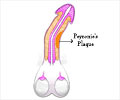Erectile dysfunction (ED) not only interferes with romance but it is a powerful early warning sign for serious heart disease - including heart attack and death - in men with type 2
Erectile dysfunction (ED) not only interferes with romance but it is a powerful early warning sign for serious heart disease - including heart attack and death - in men with type 2 diabetes, according to two new studies.
Besides this, one of the studies also showed that cholesterol-lowering medications could cut the risk of heart problems by about one-third and suggested that Viagra and other compounds in the same drug family might offer similar protection.The study highlights the importance of urging men to report ED to their doctors, and of focusing treatment not only on overcoming sexual dysfunction but also on improving overall cardiovascular health.
"The development of erectile dysfunction should alert both patients and healthcare providers to the future risk of coronary heart disease," said Peter Chun-Yip Tong, Ph.D., an associate professor in the Department of Medicine and Therapeutics at The Chinese University of Hong Kong, Prince of Wales Hospital, Hong Kong.
"Other risk factors such as poor blood glucose control, high blood pressure, high cholesterol levels, smoking and obesity should be reviewed and addressed aggressively," he added.
Diabetes, erectile dysfunction and heart disease share an ominous link: damage to the blood vessels by high blood sugar levels.
The same process that hinders the extra blood flow needed to maintain an erection can have even more serious consequences in the heart.
"The first event is probably endothelial dysfunction-when the smoothness and reactivity of the blood vessel are damaged. This process encourages local inflammation on the inner surface of the blood vessels and the deposition of cholesterol, resulting in formation of clots and atherosclerosis. Therefore, there is a high risk of blockage of blood vessels in the heart, which can lead to a heart attack," said Dr. Tong.
Men usually show signs of ED more than three years before the onset of symptoms of coronary heart disease.
In one study of diabetic men, symptoms of ED always preceded coronary symptoms.
In the first study, researchers set out to determine whether ED could be used as an early warning sign of poor cardiovascular health.
Tong and his colleagues recruited 2,306 men with type 2 diabetes, performing a thorough medical evaluation of diabetic control and complications, including damage to the kidneys, eyes and cardiovascular system.
At the starting of the study, just over one-quarter of the study participants had ED. None of the participants had any signs or history of heart disease, vascular disease or stroke.
The researchers followed-up the patients for an average of four years and found during that time, 123 men either suffered a heart attack, died from heart disease, developed chest pain caused by clogged arteries, or needed bypass surgery or a catheter procedure to restore blood flow to the heart.
They found that men who had ED at the beginning of the study were far more likely to develop one of these signs of coronary heart disease than were men who initially did not have ED.
Researchers then conducted an analysis that included many different characteristics that, like erectile dysfunction, were associated with the development of CHD, including age, high blood pressure, the need for cholesterol- or blood-pressure-lowering medications, the duration of diabetes, and damage to the kidneys or the eyes as a result of diabetes.
Even after taking these characteristics into account, ED was found to be an independent early warning sign of coronary heart disease.
In fact, ED signalled a 58 percent increase in the risk of CHD. Only spillage of large amounts of protein in the urine - a sign of extensive kidney damage - was a stronger warning sign, doubling the risk of heart disease.
In the second study, researchers from four medical centres in Italy focused on 291 men who not only had type 2 diabetes but also silent CHD discovered by stress testing and confirmed by x-ray angiography.
Of these, 118 had ED at the beginning of the study. Lead author Carmine Gazzaruso, M.D., Ph.D., and his colleagues followed-up patients for an average of nearly four years, documenting major adverse cardiac events (MACE), which they defined as not only CHD events but also stroke, mini-stroke (transient ischemic attacks) and arterial disease in the legs.
They found that patients who had ED at the beginning of the study were twice as likely to suffer a major adverse cardiac event when compared to those without ED.
The also found that among patients who were taking cholesterol-lowering statins, the risk of MACE was reduced by one third.
Viagra and other medications in a family known as 5-phosphodiesterase inhibitors also appeared to reduce the MACE risk; however this finding was just beyond the cusp of being statically significant.
"While we have known that ED shares many common risk factors with CHD, such as hypertension, smoking, dyslipidemia and diabetes, what is new here is that ED remained a significant risk factor for developing heart disease after controlling for other cardiovascular risk factors," said Robert A. Kloner, M.D., Ph.D., F.A.C.C., a professor of medicine at the Keck School of Medicine at the University of Southern California, and director of research for the Heart Institute at Good Samaritan Hospital in Los Angeles.
"Men should know that ED is a true harbinger of atherosclerotic coronary heart disease," he added.
The studies have been published in the May 27, 2008, issue of the Journal of the American College of Cardiology (JACC).
Source-ANI
SRM
 MEDINDIA
MEDINDIA
 Email
Email









